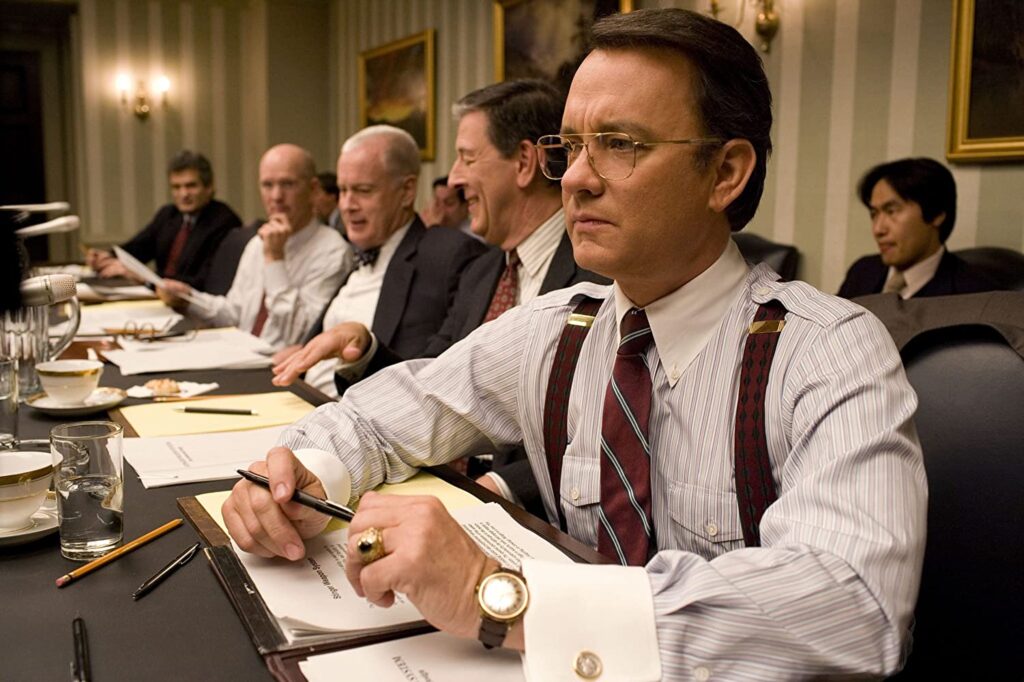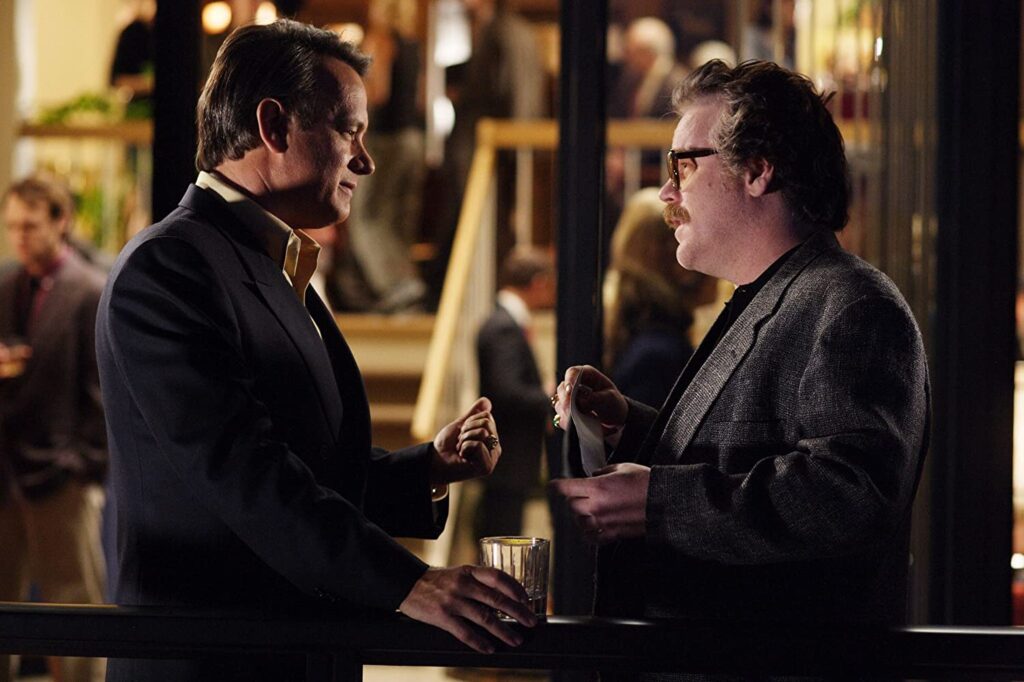Before he passed away at the age of 46, Philip Seymour Hoffman starred in 52 feature films. Starring roles, character pieces, chameleon work—he left a legacy nearly unmatched in both quality and quantity. Now, with P.S.H. I Love You, Jonah Koslofsky wafts through the cornucopia of the man’s offerings.
The congressman (Ned Beatty) has a pastry in his hand. The camera follows him as he leaves his office, in classic walk-and-talk, West Wing fashion. As Aaron Sorkin characters often find themselves, he’s in the midst of a pompous, preposterous rant to his colleague Charlie Wilson (Tom Hanks). “Afghanistan, Egypt, Pakistan, Saudi Arabia—these are all totalitarian dictatorships,” he spurts, “and they’d like to blow the only democracy in the region right into the Mediterranean!”
But as he and Wilson exit, they brush past a group of Indigenous People, who’ve clearly been waiting for hours to speak to the representative. Their heads turn in disbelief at this obvious insult. This subtle, entirely visual joke from director Mike Nichols signals what sets Charlie Wilson’s War apart from so much Sorkin: Instead of taking this congressman—this apparent paragon of democracy at face value—we see him as a hypocrite, proudly continuing the tradition of ignorance and oppression this country was built on. It’s pretty funny too.
Though his screenwriter may be prone to outdated proclamations of exceptionalism, the legendary Nichols, who helped found The Second City and made about a dozen great movies including The Graduate and Who’s Afraid of Virginia Woolf? knows better. In any other hands, Charlie Wilson’s War could’ve been so painfully 2007 that it should’ve been left behind with the 43rd president. It’s based on a true story, and only Sorkin could’ve written it. We meet Charlie in a hot tub in the early 1980s, surrounded by strippers and blow, as he’s hearing a pitch for a television show set in Washington.

Wink! Sorkin’s in pure West Wing mode, writing Wilson a reckless-yet-likable leader. Charlie might party a bit too hard, but his heart’s in the right place, especially as he learns about the Afghan freedom fighters dying at the hands of invading Soviets. It’s true; this film too is dedicated to the brave Mujahideen fighters of Afghanistan, whom Charlie wants to help after wealthy Evangelical Joanne Herring (Julia Roberts) prods to visit a refugee camp.
And so Congressman Wilson must figure out a way to arm the Mujahideen without igniting World War III. A covert operation like this lands him in the orbit of Gust Avrakotos (Philip Seymour Hoffman), a CIA case officer that’s at least a little brisk, or as he’s described in his first scene, “coarse.” As soon as we meet him, Gust chews out his boss for reassigning him and breaks his window a second time, all while effortlessly demonstrating that he’s the smartest guy in the room.
In other words, he’s also a man in a Sorkin movie. And you know what? It’s fun as hell to watch Hoffman deliver some crisp Sorkin-isms. In my last piece, I criticized Scent of a Woman for lacking any sort of naturalism in its performances, and honestly, Charlie Wilson’s War doesn’t fare much better. But not everything needs to be a Noah Baumbach or Richard Linklater movie, and in the hands of someone like Hoffman, Sorkin’s rapid-fire banter is just delightful.

Behind what looks like a covert disguise of hilariously enormous glasses and a bushy mustache, Hoffman has to sell Avrakotos as a hero. It’s no easy task; after all, he brags about toppling governments. Unlike that congressman, the movie really does position Avrakotos in a positive light: He’s an effective, intelligent spy who may not be great with people, but he sees the world as it is and wants to do his part to make it better. Equipped with a gravelly inflection, Gust’s perspective is quite convincing. Hoffman does his job: We don’t question this CIA agent, but maybe we should.
Charlie Wilson’s War tries to frame Wilson in equally heroic terms, but it stumbles here. Hanks struggles with Charlie’s rougher edges. Instead of neatly fitting into his “America’s Dad” persona, the movie asks us to buy him as a sexpot scoundrel, and the actor can’t quite turn off his naturally safe presence. Or maybe it’s the other way around. Perhaps, the film is using Hanks’ charms to sell Charlie Wilson to the audience. That’s a dangerous deal, considering Wilson’s actions—and this country’s intervention—didn’t exactly turn Afghanistan into a peaceful paradise.
Of all its peers including Sorkin’s other stuff and Nichols’ oeuvre, the movie Charlie Wilson’s War most resembles is actually Iron Man. These late-Bush era relics both argue that it’s not intervention that’s the problem, but how we intervene that needs to change. Where Before the Devil Knows You’re Dead—another final work from an aging master co-starring Hoffman—felt ahead of its time, Nichols’ film doesn’t observe its material with 2020 levels of skepticism.
Alas, the moments that truly stick out—that is, when Nichols and Sorkin threaten to actually interrogate this story—are a few too few.
In the last 10 minutes after Wilson and Avrakotos have bent over backwards to arm the Afghan fighters to the teeth, Nichols and Sorkin try to sweep the rug out from under the viewer. They reveal that, without proper aid, the now-liberated country could fall into disarray. A bolder film might’ve incorporated this critique into its entire runtime, or spent longer than the last few minutes in the less than ideal reality.
I’m not sure Sorkin knows how to write that movie, though Nichols gets us closer (although the director doesn’t seem to have much of a problem with his subject’s misogyny). Their collective effort is a well-oiled machine, with its 102 minutes never dragging. It’s all so tight and entertaining that it can’t quite function as a cautionary tale.
And so Charlie Wilson’s War remains a breezy watch 13 years later, bolstered by great work from Hoffman. Alas, the moments that truly stick out—that is, when Nichols and Sorkin threaten to actually interrogate this story—are a few too few.